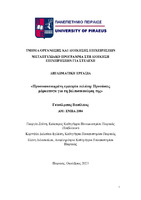Προσωποποιημένη εμπειρία πελάτη : προτάσεις μάρκετινγκ για τη βελτιστοποίηση της

View/
Keywords
Εξατομίκευση ; Αφοσίωση πελάτη ; Brand love ; Brand trust ; Brand imageAbstract
Today's consumer is perhaps more connected and informed than ever before. The ability of the modern consumer to check prices in real time, compare products/services and values, socially interact about all of this (exchange opinions, data and perspectives) and demand more and more is unique in history. For the first time, consumers, may have communication channels where they can draw on the experiences of individuals around the world and challenge the relationships they have had with organizations. While this connectivity has enabled consumers to shop in many different ways, or behave more intelligently than ever before, it has also created both opportunities and threats for organizations. In particular, it has allowed retailers to interact with customers in a more targeted way, and for those interactions to be increasingly personalized. Customer expectations have changed since the mid-20th century, when product accessibility was key to winning markets. Today, customers want to stand out. The desire to own a product that bears their personal signature is evident. Organizations discovered this latent need and the concept of personalization was developed. In this view, personalization is a way of recognizing the uniqueness of each customer by satisfying him/her with products that are customized according to their preferences. In practice, personalization is seen as a process that aims to curate/develop a relevant, personalized interaction to enhance customer experiences. In this paper, the above were studied and thorough statistical tests (based on the adoption of the quantitative method) were conducted to identify the relationships between personalized experience and final loyalty intentions.


